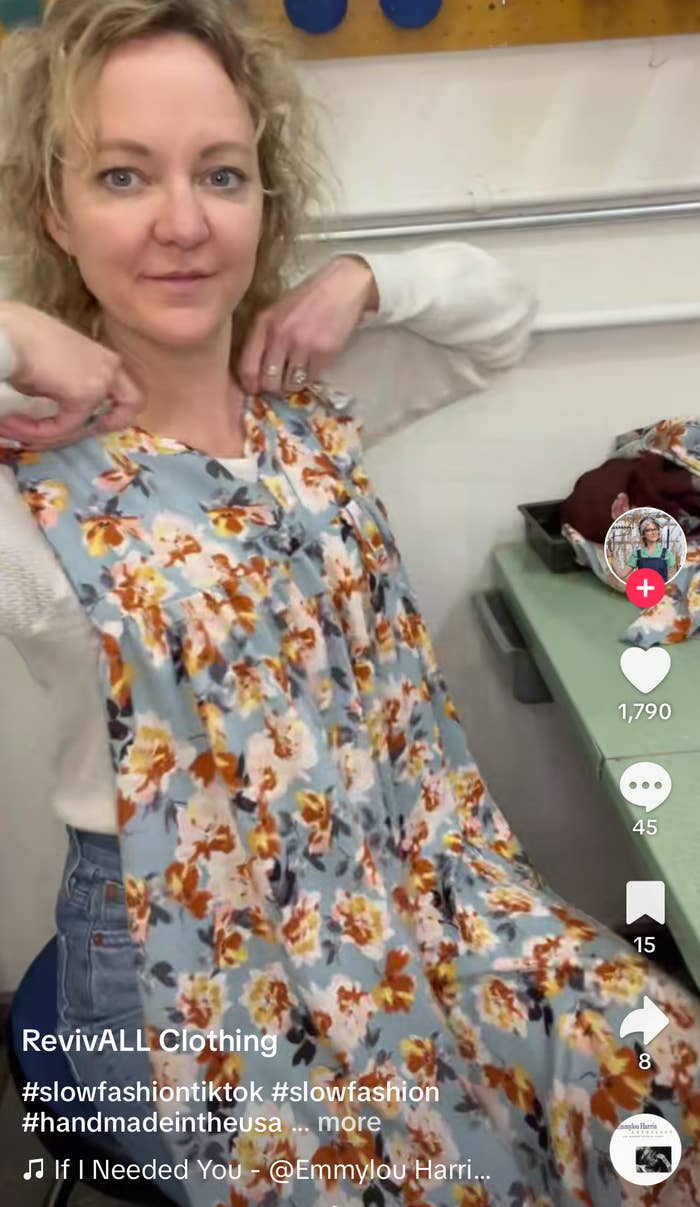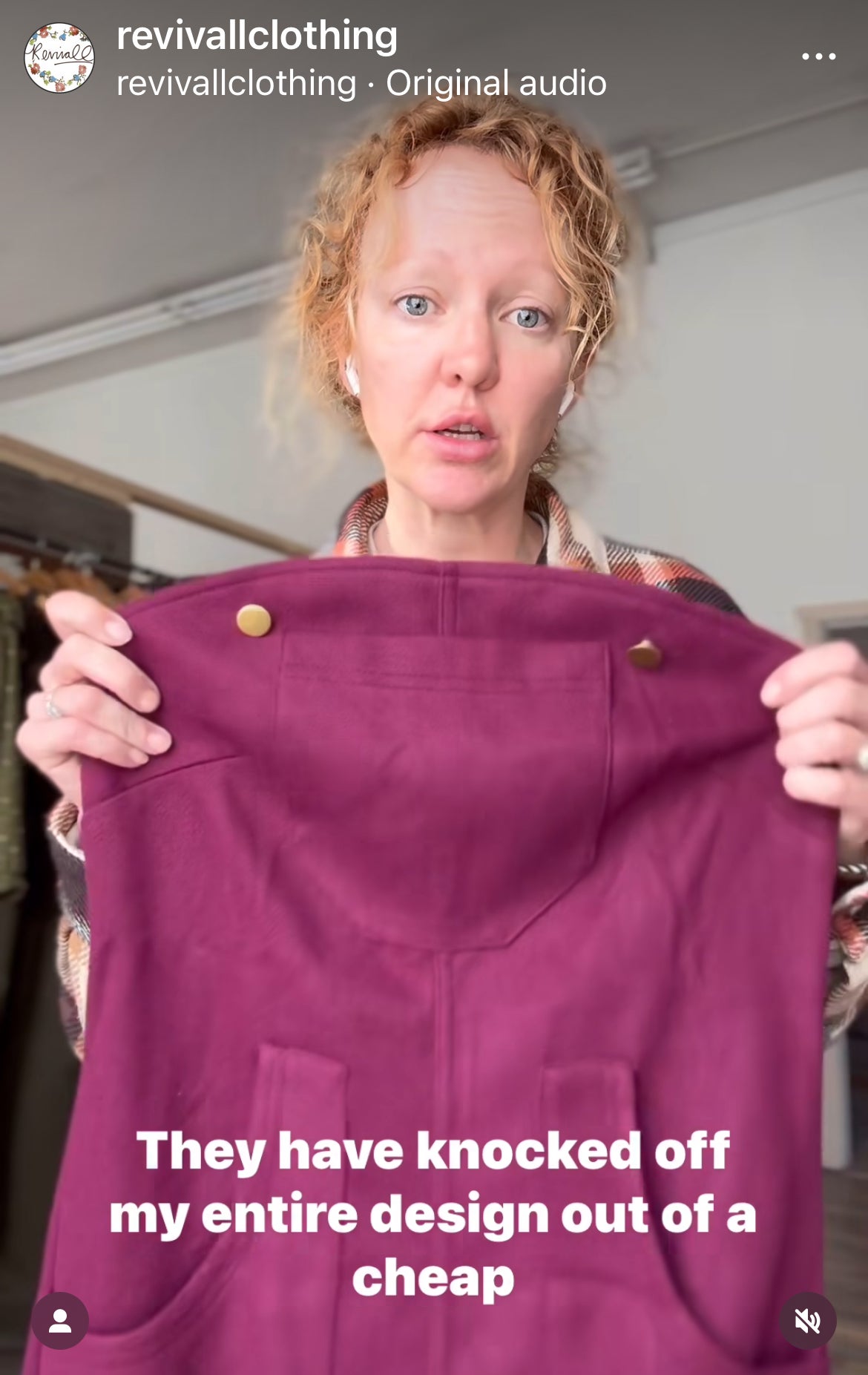Laura Fisher, 44, is the designer behind the small and sustainable fashion brand RevivAll Clothing, based in Montana. Fisher's clothes are all made in America from deadstock fabric using low-waste practices.

It's not exactly cheap to manufacture clothes this way, but to Fisher, it's an important part of her brand and what motivated her to start her business. So when she learned that her photos and designs were popping up on fast-fashion websites that she is in no way affiliated with, she was outraged.
Fisher told BuzzFeed that she became aware of the sites in early January when one of her followers spotted a strange website that appeared to be running Facebook and Instagram ads using Fisher's images and videos. "From then on, I had a constant stream of messages on my Facebook and Instagram with photos and links to the ads. I have over 70,000 followers, so you can imagine how many messages I was receiving."

Since then, she's been posting about the ordeal to alert people that they need to be careful where they shop online, because things may not be as they seem. In one video, she shows viewers what one of these sites looks like, saying, "If you go to their website, you can see that they have stolen all of my images and text from my website. ... Now, if you go to what else they sell, it's clear that this is a scam because none of these things go together."
"They've done a great job, saying that they do PayPal and that they're made in the USA, but how can you tell it's fake? Take a screenshot and do a Google Image search from the website, and then you can see the original owner," Fisher continues.
In addition, while the other sites claim that their products are made in the US, Fisher's actual site goes one step further and shows pictures of the actual people who sew her garments. Her brand also highlights these talented and hardworking tailors by including their photos on the tags for the clothes that they make.
Another tell that a retail site might not be what it seems can be found on its contact page, Fisher says. "If you go to their contact page, they only have an email, whereas if you go to my contact page, on my website, I have an email, a phone number, a physical address, and you can actually call me."
I have tried repeatedly to contact anyone at the three sites that Fisher says have posted her images and designs for comment, but I only get back automated emails in return.
At first, Fisher says, she had assumed the sites were advertising her products to cash in on orders that would never ship. She says she ordered a pair of "her" overalls from one of them to see what would happen, and when they arrived in the mail, she was devastated. She shared a video of the overalls, saying, "They have knocked off my entire design out of a cheap polyester fabric with cheap elastic straps."

Fisher told BuzzFeed, "This is happening to many different small American businesses, and there needs to be more regulation in place for protecting our intellectual property. This company has used my likeness, face, images, videos, text, and brand recognition to impersonate my brand."

To understand more about copyright law in fashion, I reached out to Michelle Mancino Marsh, a partner at the law firm ArentFox Schiff. Marsh said that, unfortunately, this kind of thing is far from rare: "Sadly, this is a very common and frustrating occurrence for brands. Brands can and should seek legal advice early on in the design process to maximize their legal power and protect their designs from bad actors."
"One of the cheapest and most effective types of intellectual property to obtain is copyright protection for original works, which can include clothing, footwear, and jewelry designs. In short, proactivity is power, and designers should get their designs evaluated for legal protection as early as possible."
And she explained that various circumstances may influence a brand's ability to protect its designs, images, and products. "They may have certain rights in their designs depending on the uniqueness of the design and depending on whether they have taken the effort to protect them using the available patent, copyright, and trademark laws in the jurisdiction where they reside or where they developed the design," Marsh said.
"Some brands also invest heavily in anti-counterfeiting programs, including educating the public and law enforcement officials, such as US Customs officers, on how to identify knockoffs."
US Customs and Border Protection reports that in 2023, 19,522 shipments of goods violating intellectual property rights were seized at the border. It estimates the total value of these goods to be over $2.41 billion.

As for Fisher, she's continuing to speak out, and she's passionate about changing the landscape of the fashion industry. "I wish people really understood the reasons that fast fashion is so cheap — because of the slave labor and non–living wages paid to sewers. Sewing is not something that can be automated, and needs an actual human doing the labor with a sewing machine."
"I wish people understood that slow fashion is more expensive because it is made in an ethical manner and is what clothing should actually cost. Fast fashion has completely devalued the whole industry, so no one truly understands how much labor and cost goes into creating a garment."
